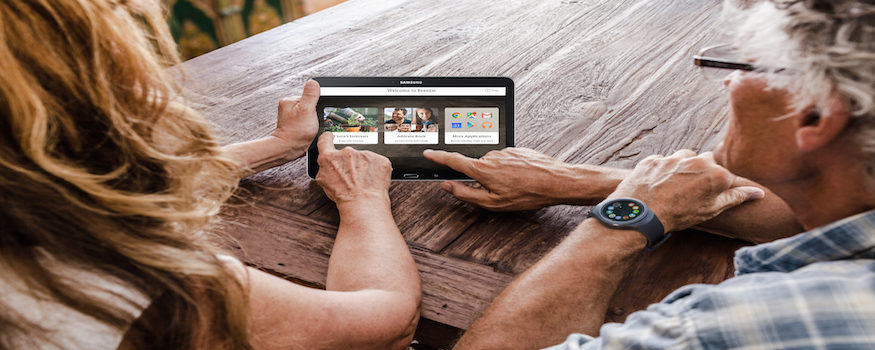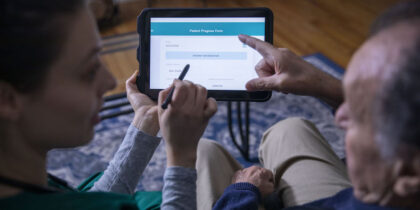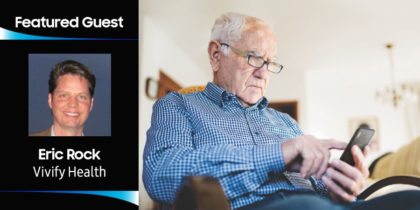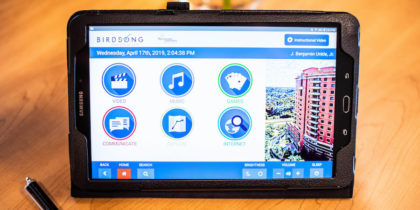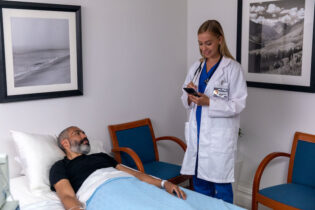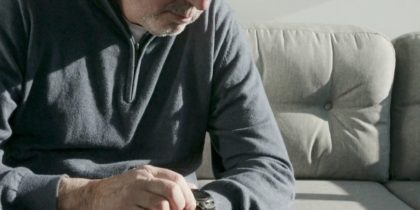How can seniors remain independent for as long as possible, and also stay healthy and safe? Given the aging population, it’s an increasingly important question. But it’s not a new one, nor is wearable technology for seniors a new solution. Anyone around in the early ’90s knows the famous tagline, “Help, I’ve fallen and I can’t get up.”
Emergency alert pendants and fall detectors for seniors were among the earliest use cases for health wearables. But as consumer technology becomes smarter and more sophisticated, so has wearable technology for seniors.
Reemo Health‘s remote monitoring platform — which runs on a Samsung Gear smartwatch — monitors movement, heart rate, location and enables push-button 911 calls. It also tracks the wearer’s quality of movement, sleep patterns and other relevant health data. This way, seniors and their families and care providers can stay connected and spot negative health trends before there’s an emergency.
Innovation and Iteration: The Reemo Health Story
Reemo originally developed gesture control technology that enabled users to operate smart home technology with the flick of their smartwatch-wearing wrists. But when Reemo tested the product with seniors, including a five-month pilot program at the Ohio Masonic Home, they found better uses for the connected platform and wearable technology.
Telemonitoring Helps Reduce Readmission Rates
See how Ascension At Home reduced readmission rates with telehealth technology. Download Now
“We spent hundreds of hours in senior care facilities, trying to understand how we could best provide value for seniors, their families and care providers,” says John Valiton, CEO of Reemo Health. “Based on their feedback, we’ve focused more on the data analytics side. Our gesture control algorithms have evolved to rate quality of motion. By combining that information with other health data, we can monitor how someone is doing, and identify when something is out of the norm for that person.”
This was a big shift. Reemo rebuilt its platform, beefed up data analytics through a partnership with Teradata, incorporated 911 service via a partnership with ADT and began expanding into new markets, such as post-acute care. After this major development, the platform could be used not only at major care facilities, but also for in-home care. Reemo and Teradata are currently working on a deployment of the solution with Mission Health Communities, a network of managed communities offering a range of services to individuals in need of high-quality healthcare and rehabilitation assistance, to collect advanced analytics that will help them improve care and reduce risk.
Valiton says the extra year of development was worth it. “We’ll always be about 85 percent built. The last 15 percent is flexible. We learn and evolve every day. We’re massive fans of iteration — understanding the real value we can bring, learning from those insights and building a better product over and over again.”
By having iteration be a main value, the company can consistently adapt their solution to fit multiple healthcare environments and use cases — from large-scale hospitals to smaller senior care facilities and beyond.
Benefits of Wearable Technology for Seniors
Three months into the Reemo relaunch, five large healthcare and assisted living systems are using the new-and-improved solution. Six more will go online soon, including one of the largest health systems in the country.
Valiton points to four major benefits of the new solution:
1. Care providers spot negative health trends and intervene early.
Care providers see daily health data, a 30-day baseline for the individual and a three-day trend from that baseline.
“They can see how the senior is trending,” says Valiton. “Do their activity levels match their care plans? What are their heart rates over time? If there are negative trends, do they need medical attention now, before there’s an emergency room trip?”
The technology also helps senior care facilities quickly identify which patients need the most attention each day. With the data collected from the Reemo solution and Gear smartwatch, healthcare providers can also pinpoint specific behavioral or health patterns throughout a patient’s care cycle.
2. Adult children get actionable insights.
Because authorized adult children can also view the senior’s data on the Reemo portal, they have more informed conversations with their parents.
“Instead of the usual phone call — ‘Hi Mom, how are you?’ ‘I’m fine.’ — they can say, ‘Hey Mom, are you staying active enough this week? Just want to make sure you’re feeling okay.’ Now they’re having an informed dialogue that gets to important issues.”
By being able to ask questions about potentially concerning health data, adult children can start creating a dialogue around preventative care, instead of constantly digging for information.
3. Seniors actually want to wear it.
Fall pendants carry a stigma for many seniors, particularly the younger ones, but even their grandkids think smartwatches are cool.
“Many seniors don’t want to feel like they’ve been put out to pasture,” says Valiton. “My dad is about to turn 70 and just retired last year. Before that, he ran a company. He doesn’t want to feel irrelevant or old. But he’s had his knee and hip replaced and has fallen a few times. If I said, ‘Hey Dad, here’s your fall pendant,’ he’d be like, ‘Get that thing away from me.’ When I gave him the watch, he said, ‘This is really cool. I’ll wear it. Thanks a lot.'”
The smartwatch also helps seniors with tasks beyond medical emergencies, making it feel less like a medical device, helping increase adoption.
4. Seniors feel confident and independent.
Valiton’s favorite feedback came from a woman in a large university trial, who said the Reemo solution changed how she and her husband live their lives. In the past, when she shopped, her husband drove her and sat in the parking lot. Now, she feels confident running errands alone.
“She can push a button to be connected to her husband or get an emergency responder wherever she is,” says Valiton. “That makes her feel independent. He gets to stay home, so it’s a win/win, and he can pinpoint her exact location if she needs help.”
With the Reemo solution, the company believes seniors can focus on the main benefits of independence when paired with a smartwatch: safety, awareness and connectivity.
The Reemo solution provides real-time awareness into wearers’ daily activity and overall health, while connecting them with healthcare professionals and loved ones who want to keep them safe — wherever they are.
Learn more about how healthcare technology solutions can enhance efficiencies and improve the patient experience.
